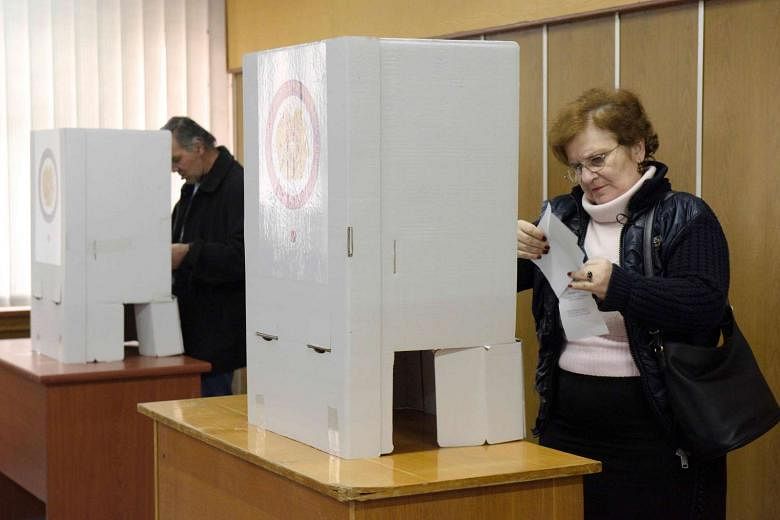YEREVAN (AFP) - Armenians voted in landmark legislative elections on Sunday (April 2) for the first time since the adoption of constitutional reforms aimed at transforming the ex-Soviet country into a parliamentary republic.
The election is seen by the West as a key democratic test for the small landlocked nation of 2.9 million, which has no history of transfers of power to an opposition through the ballot box.
Opposition politicians on Sunday reported violations at polling stations after previously warning that the government is preparing mass electoral fraud.
"We have recorded numerous violations at polling stations - violation of ballots' secrecy and multiple voting," Mr Hovsep Khurshudyan, one of the leaders of the Ohanyan-Raffi-Oskanyan, an opposition coalition, told AFP.
Turnout stood at 13 per cent three hours after polls opened, the Central Electoral Commission said in a statement.
The vote is dominated by fierce competition between the ruling party of pro-Moscow President Serzh Sarkisian and a coalition of opposition parties led by Mr Gagik Tsarukian, a former arm wrestler who is one of the country's wealthiest businessmen.
"I gave the Republican Party another chance because Prime Minister (Karen) Karapetyan is an energetic man with fresh ideas, he gives us hope for a better future for the country," one voter, 37-year-old Svetlana Sarkisian, told AFP at a polling station in Yerevan.
Another voter, 69-year-old pensioner Garnik Mnatsakanyan, said she "voted for Tsarukian who really cares about ordinary people's lives."
Ahead of the vote, the European Union delegation to Armenia and the US embassy said in a joint statement that they were "concerned by allegations of voter intimidation, attempts to buy votes, and the systemic use of administrative resources to aid certain competing parties".
There are also fears of violence after 10 people were killed in 2008 clashes between police and opposition supporters following Mr Sarkisian's election.
This time, the country aims to hold an exemplary vote to elect "a parliament trusted by society," the president told AFP in an interview in March.
He said his government "has made enormous efforts so that (Sunday's) milestone vote is flawless."
The polls come after constitutional amendments initiated by Mr Sarkisian in 2015 that his opponents say were designed to keep the ruling Republican Party in power.
The changes were passed after a referendum, but they also prompted thousands to rally in protest.
The amendments will shift the country away from strong presidency to a parliamentary form of government after Mr Sarkisian's second and final term ends in 2018.
TWO DECADES IN POWER
The opposition alleges that the changes were made to allow Mr Sarkisian, 62, to maintain his grip on power by remaining party leader after he steps down as president.
"The amendments will perpetuate the rule of Sarkisian and his Republican Party," which has held onto power for two decades, said Mr Aram Manukyan, an MP from the Armenian National Congress opposition party.
Mr Sarkisian has denied the allegations and defended the changes as "part of Armenia's democratisation process."
Ahead of the vote - in his first comments on his political future - Mr Sarkisian told AFP he would remain "active" after he left office and hinted that he would keep influencing Armenia's politics as leader of the Republican Party.
"As chairman of the Republican Party, I assume responsibility for my teammates," he said when asked about his post-2018 future.
POPULIST PROMISES
Both ruling and opposition parties have campaigned on populist promises such as "jobs, wages, pensions," said Mr Gevorg Poghosyan, a pollster at the Armenian Sociologists' Association, told AFP.
"That's what matters to the voters" in a country where about 30 per cent of the population live under the official poverty line, he said.
"The Republican Party and Tsarukian's coalition are likely to get the lion's share of seats in the new parliament - more than 80 per cent," he predicted.
Mr Tsarukian has built his campaign on lavish promises to cut tariffs on natural gas and electricity and significantly increase public-sector salaries and pensions, accusing the government of failing to address widespread poverty and endemic corruption.
A total of five parties and four electoral blocs are running in Sunday's vote, with 101 parliamentary seats up for grabs under a proportional representation system.
A party needs to clear a five-percent threshold to be represented in parliament, while an electoral bloc made up of several parties needs to garner at least seven percent of the vote.
Voting, which started at4am, GMT (12pm, Singapore time) and ends at 4pm, GMT, is being monitored by international observers from the Organisation for Security and Cooperation in Europe.



